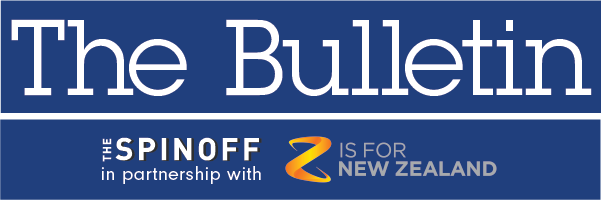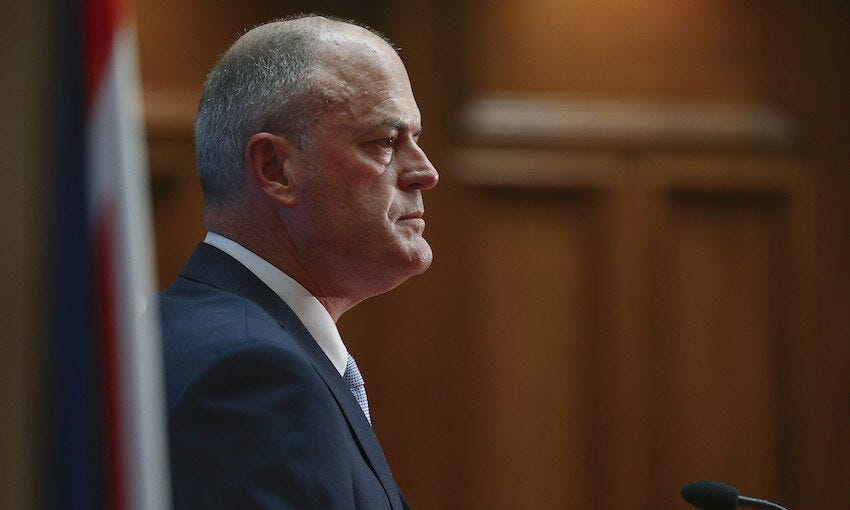Did Todd Muller lie about Boag and Woodhouse?
For a politician who has presented himself as a straight shooter, being forced to admit that he "could have been clearer" is clearly damaging

Good morning and welcome to The Bulletin for Monday 13 July, by Alex Braae for The Spinoff. Presented in partnership with Z Energy.
In today’s edition: Self-inflicted story puts National on the defensive, another escape attempt from managed isolation, and a series of party events ahead of election.

Image: National leader Todd Muller (Getty Images)
There's a convention in journalism called Betteridge's law of headlines. Basically what it means is that headlines that end in a question mark can almost always be answered with a no. So it is with today's Bulletin. In the strictest sense, National leader Todd Muller did not lie about his knowledge of whether former party president Michelle Boag leaked active Covid-19 case details to health spokesperson Michael Woodhouse. He was aware that Boag had sent some information to Woodhouse, but the case he made to One News on Friday was that "what Michael Woodhouse received was not the same information as what Hamish Walker received.” He also defended Woodhouse, who did not leak that information to the media, as Walker did – losing his political career in the process.
The thing is though, Muller learned about this from Woodhouse on Tuesday night, and then later gave a flat answer of no to questions about whether Boag had also sent Woodhouse information. And so while it isn't a lie in that strict sense, Muller was given a clear opportunity to come clean with anything that might be pertinent to the story, and he chose instead to try and get through without revealing it. That meant that when it all came out on Friday, it suddenly became a very fair question to ask if Muller is hiding anything else, and whether his statements on the matter could be trusted. As press gallery veteran Patrick Smellie put it, "repeatedly asked whether he knew that other National Party MPs had received leaked information from Boag, Muller tried various formulations to avoid saying “no”, but eventually said “no” when he should have said “yes”. For a politician who has always presented himself as a straight shooter, being forced to admit that he "could have been clearer" doesn't look like that at all.
There are also serious questions around Woodhouse's actions with those emails Boag sent him. He told Radio NZ that he deleted those emails – sent in mid-June – at the start of the week, when it was becoming clear that there was going to be an investigation into how confidential Covid-19 patient information was getting out. "He also deleted the emails from the trash folder," said the story, with Woodhouse arguing that he thought it was the right thing to do. It's difficult to imagine how attempting to scrub all traces of potentially relevant information from your inbox when an investigation is about to get underway could be considered the right thing to do, but at this stage we'll have to take his word for it that those were his motivations.
The issue has forced the party onto the defensive, right when they would have been hoping to focus on the upcoming election. Deputy leader Nikki Kaye appeared on Q+A over the weekend, and had to spend the whole extended interview talking about one aspect or another of the story, including her own close links to Boag. There was no chance to talk about National policy, or government mistakes, or her race in Auckland Central, or the price of fish, or anything at all apart from this scandal.
Senior figures in the press gallery have also made their views on the matter completely clear. There was a huge amount of commentary over the weekend from people with openly declared political views, so I'll stick with a few neutral voices on it. Stuff political editor Luke Malpass said "the leaks really call into question one of the central ideas of the Muller ascendancy: that National is the party of the grown-ups". The NZ Herald's political editor Audrey Young said that Woodhouse's reputation is "tarnished", and that "the more that information drips out, the more that questions mount about Muller's management of this crisis." Interest's Jenée Tibshraeny saw it as a case of the party "disarming" itself, on one of their strongest lines of attack. And One News political reporter Maiki Sherman described the story as "completely self-inflicted" for Muller and National. For now, it will be a nervous wait until the investigation by Michael Heron QC is completed, which is expected to land around the end of the month.
The Spinoff would like to invite Bulletin readers to a special event with Breast Cancer Foundation NZ.
The effects of Covid-19 are often hidden from every day view. Writing on The Spinoff, Breast Cancer NZ ambassador Stacey Morrison spoke to Chloe Irvine about her experience with breast cancer through lockdown.
To support Breast Cancer Foundation NZ's vital work The Spinoff is holding a Pink Ribbon Breakfast. Hosted by Stacey Morrison at Kind Cafe in Morningside, Auckland on July 28 from 730am the breakfast will hear from women about their breast cancer journeyand foundation advocates about the work they do.
Limited tickets are available here for a donation of $50 or more (and includes breakfast). If you live outside Auckland or are unable to join us for breakfast we still welcome your support for Breast Cancer Foundation NZ.
There was another attempted escape from managed isolation over the weekend, bringing the total up to four in the space of a week. It sounds bad, but here's a stat for you from this Stuff story – about 99.9% of returnees haven't attempted to do anything of the sort. The most recent case involved someone who allegedly broke a window to get out, which indicates that security has been tightened up quite a bit. Meanwhile, Radio NZ reports Covid-19 research funding is being put towards technology that will allow police to track people with CCTV more easily, which instinctively feels a bit troubling.
A series of political party events were held over the weekend ahead of the election. Newsroom's Mark Jennings was at the Act campaign launch, to see a party revitalised by opposition to changes in firearms laws. The NZ Herald's David Fisher was in the north to see Shane Jones launch his campaign for the Northland seat – and in doing so, potentially save his party from oblivion. And One News reporter Cushla Norman had a story on a Green Party announcement for new policies aimed at getting solar panels onto state houses, and cutting coal use altogether by 2030.
Meanwhile, there was a bit of news from the Labour Party on their current allies – Newshub reports that Jacinda Ardern has made it clear that there are no plans to cut any electorate deals to ensure their survival. That's not great news for Shane Jones in Northland, or for either Marama Davidson or Chlöe Swarbrick in Tāmaki Makaurau and Auckland Central respectively. It's also bad news for Hayden Donnell, who wrote over the weekend about how much he loves a good dirty electorate deal.
National MP Dr Jian Yang is retiring from politics at the election. He goes after several years of questions about his past, in which he taught at a spy school in China – questions which continued to swirl because he never really addressed them. The NZ Herald's Derek Cheng reports that he is understood to have been pushed by senior National MPs to go. For his part, Yang has always insisted that his full loyalty has been to New Zealand over his political career.
Meanwhile, the news of Dr Yang's retirement headlined this article about select committee hearings into Chinese government influence operations, by Stuff's Thomas Coughlan. There are two really pertinent points I think the article highlights. The first is that the spotlight has also been put on local politics – in part because mayors and councillors can have influence over whether Belt and Road projects go ahead. And the second point is that it underlines that people of Chinese ethnicity are not synonymous with the Chinese Communist Party or government, and it would be wrong to see it like that.
There could be problems caused by Wellington City Council's new rent policies for social housing, reports Radio NZ's Eva Corlett. Many tenants will be left better off by the changes which would make rents income tested, rather than the current model of calculating it as 70% of market rents. However, for some on slightly higher (but still low) fixed incomes, that will mean the share of income that they pay as rent will rise. And we're talking about situations where every dollar counts here. The proposal has also led to calls that the Income Related Rent Subsidy be extended – currently it is available to Kainga Ora tenants, but not to those in Council housing.
An opposition view on the closure of Tiwai Point which was announced last week: Former National government minister Steven Joyce has hit out at the government for doing nothing to save the smelter, and with it a huge share of the Southland economy, in a column on the (paywalled) NZ Herald. While Joyce acknowledges that former finance minister Bill English made it clear that smelter wouldn't get any more money, that was in 2013 – well before the Covid-19 recession – and the current decision comes at a time when cash is also being splashed on some decidedly less safe bets, like a $10 million bailout for AJ Hackett Bungy with no guarantees of tourism coming back.
A correction in the form of a bit of feedback: Last week I referred to the 'Manapouri Dam' – which as self-described 'engineering tragic' Jimmy pointed out is not correct. Here's what he said:
"Last line refers to Manapouri as a dam - it isn’t. It’s a lake that feeds a hydroelectric power station. That sounds an awful lot like a dam, but dams are large concrete structures that feed power stations through penstocks (big tubes).
What's unusual about Manapouri station is a dam structure was never built; it uses the lake's natural geography as water storage, rather than a huge concrete structure. Instead of providing an artificial barrier to control the flow of water, they bored holes into the edge of the lake and mountain underneath it."
Got some feedback about The Bulletin, or anything in the news?
Drop us a line at thebulletin@thespinoff.co.nz

Right now on The Spinoff: In news and politics – Michael Andrew looks at energy use data to get a sense of how the post-Covid recovery is taking shape. Jeremy Rose writes about the increasing attention being paid to Modern Monetary Theory in economics. Katy Wakefield and Emma McInnes write about the likelihood of sexist outcomes from the new plans for mass transit in Auckland. Greg Pollock writes about the need to invest in public transport if we really want to revitalise cities, rather than just the big ticket infrastructure projects. Karen Phillips gives a view from dry Northland on Auckland's drought, and some tips for how to get through in future. Mike Fox writes about the need for new regulatory processes to get the right kind of affordable housing built. The Act Party's Dave King makes a contribution to a series I'm really enjoying – getting the political views of those ranked last on their party's list.
And in culture: Michelle Langstone has a wonderfully descriptive piece about the feeling of shopping during the supermarket's 'quiet hour'. Laura O’Connell Rapira writes about the increasing calls for a new Matariki public holiday. Jihee Junn looks through the most entertaining Advertising Standards Authority complaints of the year. And artist Shaquille Wasasala writes a furious open letter to music festival bookers, who have once again put together overwhelmingly stale and male lineups.
For a feature today, a fascinating look at the mounting feeling in Scotland that they'd be better off independent from the UK. Writing in the Guardian, columnist Rafael Behr argues that a crisis is looming for the union on a number of different levels, and public sentiment north of the border is turning in favour of getting out. What's more, the country right now is very poorly prepared for something like that happening. Here's an excerpt:
Between now and next May’s Scottish parliament elections, Britain must pass through more Brexit turbulence; transitional arrangements expire on 31 December. In every scenario, the SNP then complains that English Tories have wrenched pro-European Scots from their home continent without consent. Barring some unforeseen political accident, Sturgeon will then be confirmed as first minister, arguing that her refreshed mandate compels Westminster to legislate for an independence referendum.
Johnson will refuse, thus vindicating the nationalist view that Tory England always represses the will of Scotland. But the prime minister might prefer that charge to a gamble on having his remaining time in office consumed by a battle to save the union, and possibly ending up in posterity as the man who broke the kingdom.
In sport, the Warriors are seeking answers from the NRL referees boss after being on the wrong end of a horrific string of calls, reports Stuff. Having seen it live, they've got a point – the team were not awarded a single penalty over the course of the match, and a try was disallowed in ridiculous circumstances. Had it been awarded, the Warriors probably would've beaten the Gold Coast Titans – as it was, they lost 16-12 after falling to pieces in the second half. It will add fuel to the fire for the perceptions of many fans on this side of the ditch, that the Warriors almost never seem to get calls in their favour.
That's it for The Bulletin. If you want to support the work we do at The Spinoff, please check out our membership programme




